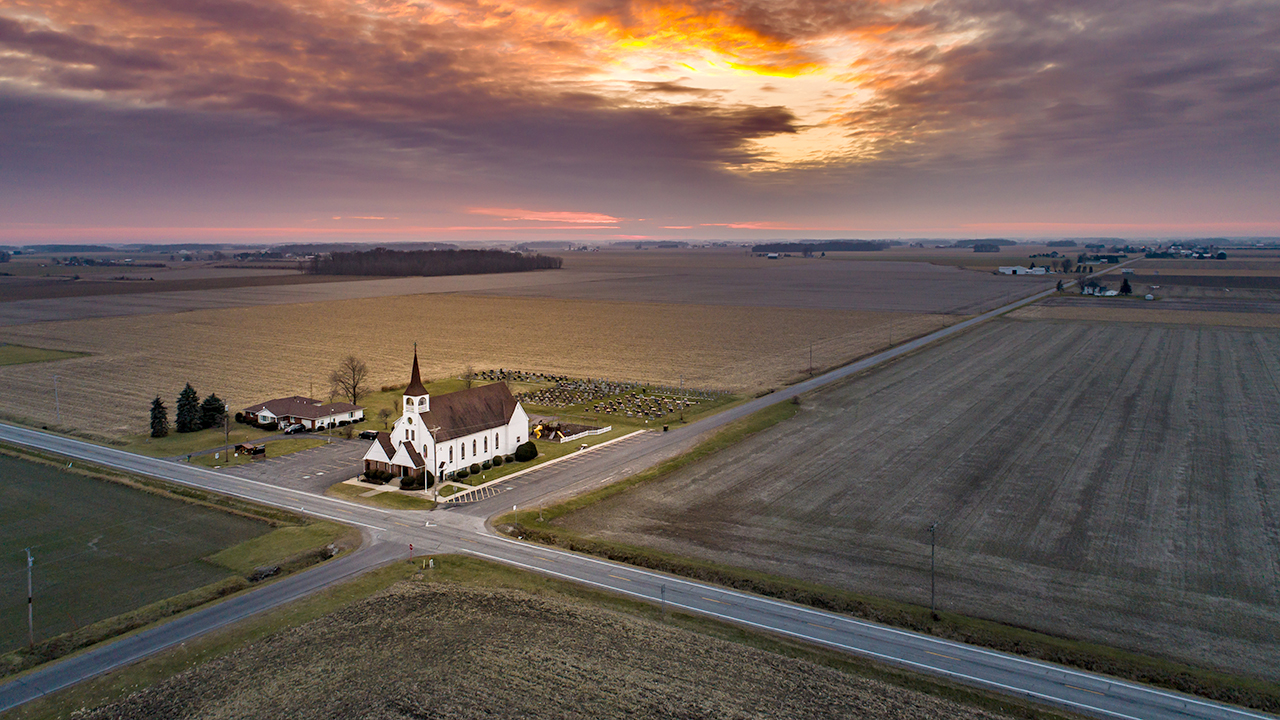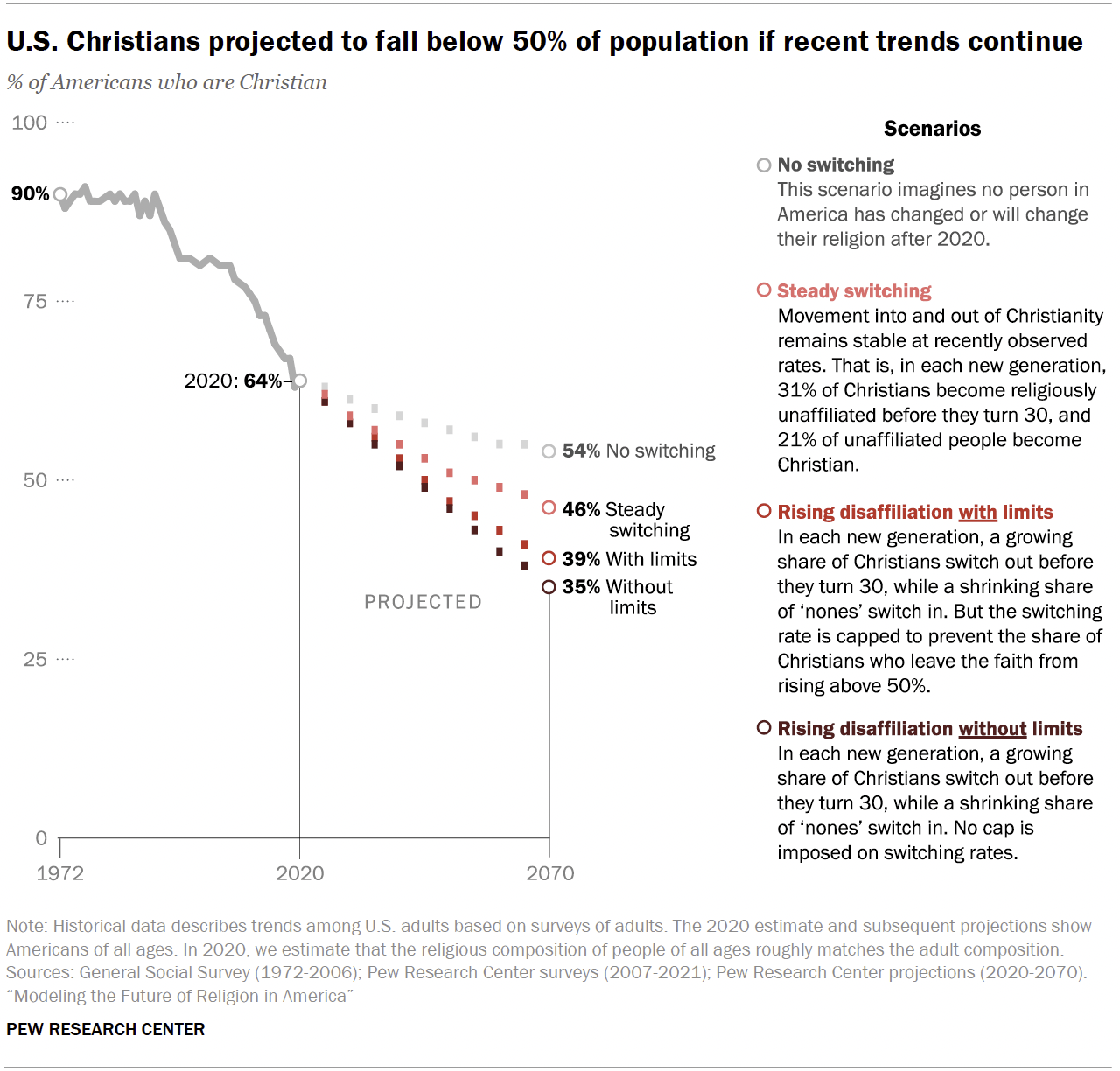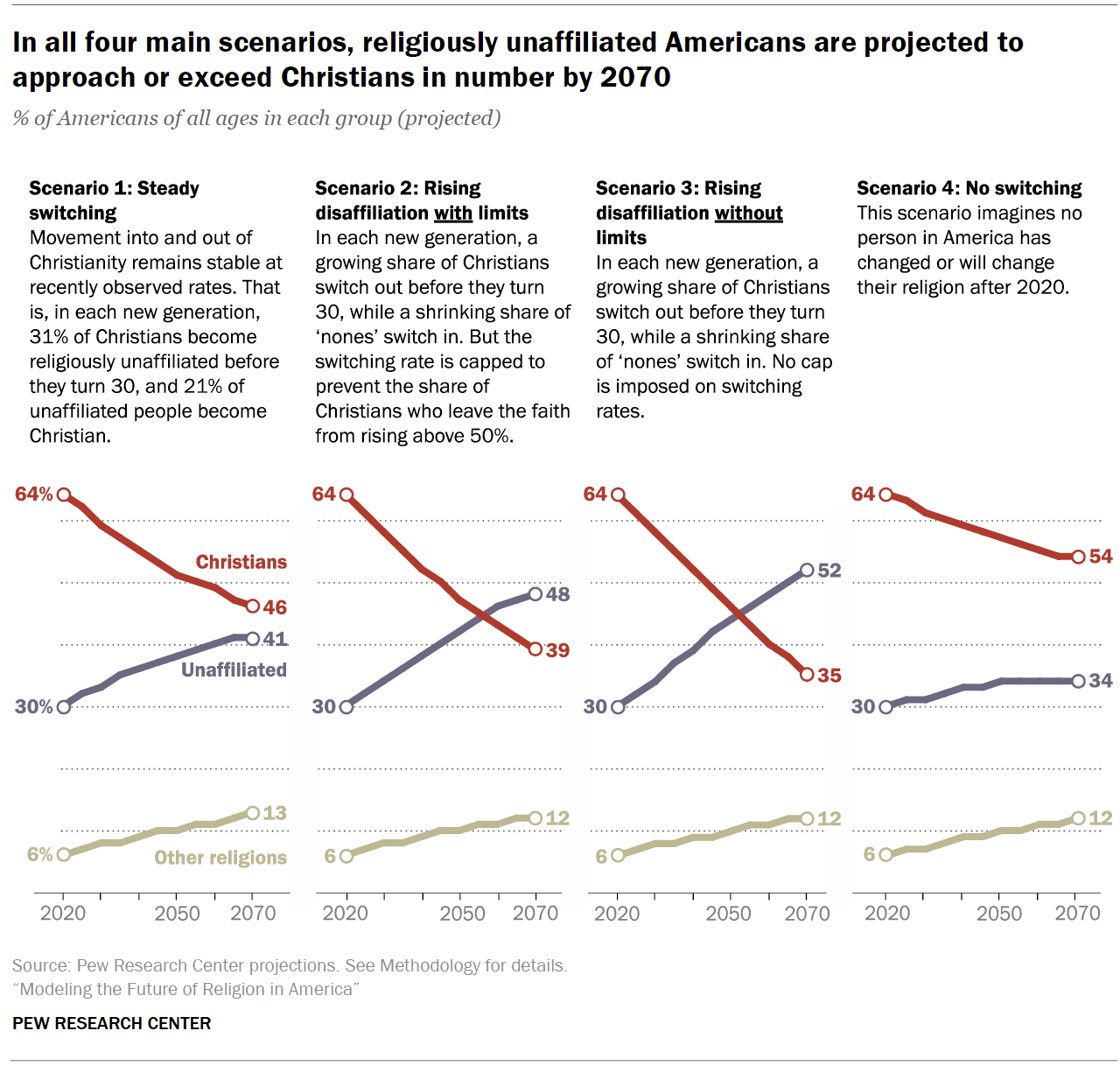In an extensive world survey conducted by Pew Research and funded by the Templeton Foundation, Pew says, "If recent trends in religious switching continue, Christians could make up less than half of the U.S. population within a few decades."
Underline the word "could."
Pew reports: "Since the 1990s, large numbers of Americans have left Christianity to join the growing ranks of U.S. adults who describe their religious identity as atheist, agnostic, or 'nothing in particular.' This accelerating trend is reshaping the U.S. religious landscape, leading many people to wonder what the future of religion in America might look like."
If religion is no longer important, why would religious freedom be important?
Also underline the report from a different perspective: "The gates of hell shall not prevail against my Church." Jesus.
Let's take a closer look at our times.
Be informed, not misled.
A shrinking Church?
What if Christians keep leaving religion at the same rate observed in recent years? What if the pace of religious switching continues to accelerate? What if switching were to stop, but other demographic trends – such as migration, births, and deaths – were to continue at current rates? To help answer such questions, Pew Research Center has modeled several hypothetical scenarios describing how the U.S. religious landscape might change over the next half-century.
The Center estimates that in 2020, about 64% of Americans, including children, were Christian. People who are religiously unaffiliated, sometimes called religious “nones,” accounted for 30% of the U.S. population. Adherents of all other religions – including Jews, Muslims, Hindus, and Buddhists – totaled about 6%.1.
Then there is this caveat.
Depending on whether religious switching continues at recent rates, speeds up, or stops entirely, the projections show Christians of all ages shrinking from 64% to between a little more than half (54%) and just above one-third (35%) of all Americans by 2070. Over that same period, “nones” would rise from the current 30% to somewhere between 34% and 52% of the U.S. population.
What is "switching" and who are "nones?"
Current rates of switching are based on responses from more than 15,000 adults to two questions posed in the Pew Research Center survey: “In what religion, if any, were you raised?” and “What is your present religion, if any?”
They also found that "In many cases, switching does not happen in a single moment. Religious “nones” often describe their disaffiliation as a gradual process, and some may never have felt a strong connection to a religious identity, even though they describe themselves as having been raised in a faith tradition."
"Nones" are simply those who claim no religious affiliation. They claim no religious beliefs or list atheist, agnostic, or "nothing in particular."
This is different from previous surveys that recorded the numbers who were affiliated with a church and those who had no church affiliation. This is directed more at what the individual actually believes, as opposed to what church they may or may not attend.
Pew says this: "This report focuses on Christians and the religiously unaffiliated, the two most common, very broad religious identities in the United States today. People with all other religious affiliations are combined into an umbrella category that includes Jews, Muslims, Hindus, Buddhists, and a diverse array of smaller groups that together make up about 6% of the U.S. population."
The statistical conclusions should be concerning. Yet they are prophetic.
Any committed Christian will find some concern in these stats. Yet, there is a prophetic assurance.
First, why is this happening? Bottom line-- Pew doesn't try to answer the "why" question, but George Barna may be answering it in other unrelated surveys.
Customized Christianity.
Barna believes "the evil one" is "luring people into believing that they can combine and adopt as many worldviews as they want."
He is warning that "America is a nation in crisis" because its citizens do not hold a biblical worldview and will instead add their own "worldly ideas."
"Your worldview is the filter that you use to see and understand and experience and respond to the world around you. Because your worldview enables you to make sense of the world, you need a worldview just to get through every day," Barna explains.
"In fact, every single decision that you make, and you make hundreds of them if not thousands of decisions every single day — every one of those flows through your worldview. The choices that you make are a result of what you believe, as described by your worldview."
"The crisis is that the predominant worldview in America is syncretism," he says.
He has found in his surveys that there are seven major worldviews that Americans are most influenced by: biblical theism, Eastern mysticism, Marxism, moralistic therapeutic deism, nihilism, postmodernism, and secular humanism.
The most common worldview isn't any of the seven main adopted ones, he says the primary worldview dominating America is "syncretism," or varying combinations of all seven worldviews into one belief system.
A customized Christianity. A religion that serves one's own, personal goals and ambitions. Not the God who created us.
Some personal thoughts.
After a life in Christian ministry, I've noticed, in recent years, a definite drift in preaching from speaking God's Truth to individuals and to the culture to being replaced by sermons crafted to present a faith that serves the servant, rather than leading people to truly submit to the Lordship of Jesus Christ in our lives.
Perhaps well intended, a culturally friendly gospel has emerged in which it seems we can direct God, rather than be directed by Him.
We have fashioned a gospel that is more of a motivational tool than the transformational power of the biblical gospel.
While this gospel may be a good fit in the culture and in the community, it transforms neither the person nor the community.
And I believe that's how we got here.
Only 6% of Americans have a "biblical worldview."
Only 2% of American parents with children under the age of 13 have a biblical worldview.
When the so-called religious left---Nancy Pelosi, President Biden, and others make outlandish claims that abortion is godly and sacred, "the Bible tells us to worship the environment" (Pelosi) or when Oprah claims to be a devout Christian but does not believe Jesus is the "only" way to God, and then President Obama makes the same claims, we shouldn't wonder how we go to this place.
We are here because we are spiritually uninformed.
Paul described our condition and our times with this: II Timothy 3:1-5
This know also, that in the last days perilous times shall come. For men shall be lovers of their own selves, covetous, boasters, proud, blasphemers, disobedient to parents, unthankful, unholy, without natural affection, trucebreakers, false accusers, incontinent, fierce, despisers of those that are good, traitors, heady, highminded, lovers of pleasures more than lovers of God; having a form of godliness, but denying the power thereof: from such turn away.
A perfect description of our times. Yet in all this be hopeful. Jesus, Himself said, "the gates of hell shall not prevail against My Church."
Be Informed. Be Discerning. Be Vigilant. Be Engaged. Be Bold. Be Ready. Be Prayerful.



